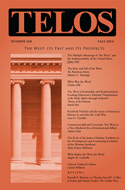By Telos Press · Monday, November 3, 2014  Telos Press Publishing is pleased to announce that Matthias Küntzel’s Germany and Iran: From the Aryan Axis to the Nuclear Threshold is now available for purchase in our online store. The book is also available in Kindle eBook format from Amazon.com. Telos Press Publishing is pleased to announce that Matthias Küntzel’s Germany and Iran: From the Aryan Axis to the Nuclear Threshold is now available for purchase in our online store. The book is also available in Kindle eBook format from Amazon.com.
Why has the international community failed to prevent Iran from achieving nuclear weapons capability? Why is Germany, even today, the mullahs’ biggest trading partner in the West? What underpins the strange friendship between Germany and Iran that goes back to the beginning of the last century and has survived every war, catastrophe, and revolution?
Matthias Küntzel’s Germany and Iran: From the Aryan Axis to the Nuclear Threshold helps us to answer these questions. By unearthing new evidence from the National Archives in Washington, DC, and the German Foreign Office Archives in Berlin, Küntzel reveals that there has always been a hidden dispute between the White House and the German government over how to tackle Iran, and this dispute has deep historical roots.
Continue reading →
By Mary Frances McKenna · Thursday, October 30, 2014  In this article, I focus on the impact on modern Western thinking, ideas, and engagement with the world of the loss of the assumption of a creator, or an intelligent ordering agent, in conjunction with the emphasis on detail in preference to the whole in modern thought. I begin by discussing some of the critical dynamics contributed by Jerusalem, Athens, and Rome to the concept of Europe in an attempt to identify the source of the energy and vitality arising from this synthesis. I particularly look at the synthesis of Jerusalem and Athens, specifically how each influenced the other and where the potential for synergy arose. This Western synthesis no longer operates in Europe and the West. In this article, I focus on the impact on modern Western thinking, ideas, and engagement with the world of the loss of the assumption of a creator, or an intelligent ordering agent, in conjunction with the emphasis on detail in preference to the whole in modern thought. I begin by discussing some of the critical dynamics contributed by Jerusalem, Athens, and Rome to the concept of Europe in an attempt to identify the source of the energy and vitality arising from this synthesis. I particularly look at the synthesis of Jerusalem and Athens, specifically how each influenced the other and where the potential for synergy arose. This Western synthesis no longer operates in Europe and the West.
Continue reading →
By Telos Press · Thursday, October 30, 2014 In this video from the 2014 Telos in Europe Conference, Susanna Rizzo discusses her work on the complex history of the idea of Europe, how it has been shaped by discourses about place and the other, and then considers what the future will be for an increasingly pluralized Europe in which the notion of European identity has been reformulated.
Continue reading →
By Telos Press · Monday, October 27, 2014 In this video from the 2014 Telos in Europe Conference, Benjamin Martin talks about his research on the idea of European culture, arguing that its emergence among intellectuals after World War I and its subsequent embrace by the Nazis and Italian Fascists serves as a cautionary historical lesson.
Continue reading →
By Telos Press · Sunday, October 26, 2014 In today’s New York Daily News, Joel Kotkin writes about the death of New York’s middle class. Kotkin’s The New Class Conflict, recently published by Telos Press, is available for purchase in hardcover format in our online store, as well as in ebook format at Amazon.com (Kindle) and Barnes & Noble (Nook).
Continue reading →
By Luca G. Castellin · Thursday, October 23, 2014  At the beginning of the 1950s, Reinhold Niebuhr used the Christian concept of “irony” to explain the difficult condition of the United States in the international system. In The Irony of American History the protestant theologian analyzed the ambiguity of American foreign policy during the first years of the Cold War. According to Niebuhr, the United States was involved in an ironic confutation of its sense of virtue, strength, security, and wisdom. This confutation was due not only to its lack of (Christian) realism but also to its false claim to dominate history. After the fall of the Berlin Wall, when America became the most powerful nation of the international system, the irony of its history did not disappear. Even in a totally different situation for structure and distribution of power, compared to the one of sixty years ago, the ambiguous situation of the United States can be spelled out through irony again. This article discusses the lasting validity of the concept of “irony” used to explain the American present and, perhaps, its future. At the beginning of the 1950s, Reinhold Niebuhr used the Christian concept of “irony” to explain the difficult condition of the United States in the international system. In The Irony of American History the protestant theologian analyzed the ambiguity of American foreign policy during the first years of the Cold War. According to Niebuhr, the United States was involved in an ironic confutation of its sense of virtue, strength, security, and wisdom. This confutation was due not only to its lack of (Christian) realism but also to its false claim to dominate history. After the fall of the Berlin Wall, when America became the most powerful nation of the international system, the irony of its history did not disappear. Even in a totally different situation for structure and distribution of power, compared to the one of sixty years ago, the ambiguous situation of the United States can be spelled out through irony again. This article discusses the lasting validity of the concept of “irony” used to explain the American present and, perhaps, its future.
Continue reading →
|
|
 Telos Press Publishing is pleased to announce that Matthias Küntzel’s Germany and Iran: From the Aryan Axis to the Nuclear Threshold is now available for purchase in our online store. The book is also available in Kindle eBook format from Amazon.com.
Telos Press Publishing is pleased to announce that Matthias Küntzel’s Germany and Iran: From the Aryan Axis to the Nuclear Threshold is now available for purchase in our online store. The book is also available in Kindle eBook format from Amazon.com.  In this article, I focus on the impact on modern Western thinking, ideas, and engagement with the world of the loss of the assumption of a creator, or an intelligent ordering agent, in conjunction with the emphasis on detail in preference to the whole in modern thought. I begin by discussing some of the critical dynamics contributed by Jerusalem, Athens, and Rome to the concept of Europe in an attempt to identify the source of the energy and vitality arising from this synthesis. I particularly look at the synthesis of Jerusalem and Athens, specifically how each influenced the other and where the potential for synergy arose. This Western synthesis no longer operates in Europe and the West.
In this article, I focus on the impact on modern Western thinking, ideas, and engagement with the world of the loss of the assumption of a creator, or an intelligent ordering agent, in conjunction with the emphasis on detail in preference to the whole in modern thought. I begin by discussing some of the critical dynamics contributed by Jerusalem, Athens, and Rome to the concept of Europe in an attempt to identify the source of the energy and vitality arising from this synthesis. I particularly look at the synthesis of Jerusalem and Athens, specifically how each influenced the other and where the potential for synergy arose. This Western synthesis no longer operates in Europe and the West. 

